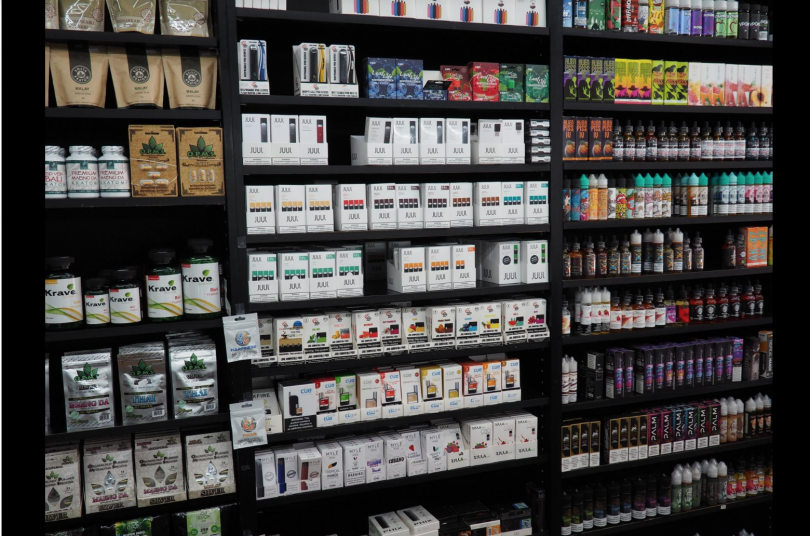By Maria Vital
BU News Service
CAMBRIDGE – E-cigarettes have taken over youth culture in Cambridge, as local high school students, like their peers around the country, have succumbed to the increasing popularity of vaping, according to health officials.
The 2018 Teen Health Survey shows a major uptick, from just 5 percent of students claiming to use e-cigarettes in 2016 to 18 percent in 2018, meaning almost one in five Cambridge teens vapes.
“This has evolved so quickly that everyone’s heads are spinning – from parents to staff to most adults who work with children. It’s moving faster than what we can run after right now,” said Tracy Rose-Tynes, clinical manager for School Health Services in Cambridge, in a phone interview.
For the first time in the history of the Teen Health Survey, an item has jumped by more than 5 percent, she said. Lifetime e-cigarette use, meaning if a Cambridge student used an e-cigarette from once to multiple times throughout his or her life, went from 16 percent in 2014 to more than double at 33 percent in 2018, according to the study.
Flavored pods draw young users
One popular e-cigarette device among students is the JUUL, which debuted in 2015. The company’s marketing seems to target younger consumers with flavored pods such as mango, cool cucumber, creme brulee and fruit medley.
“I don’t even smoke, and sometimes I also feel like I should go and try the mango JUUL pods,” Ajit Chawda, manager of Blue Moon Smoke Shop in Cambridge, said in an interview at his store.
Chawda said he believes the sweet tasting and smelling pods draw young people in and keep them on the cycle of addiction. Chawda has to refill his JUUL stock weekly due to high demand. He claimed the majority of sales to younger customers, about 60 percent, are made up of e-cigarette products like the JUUL.
In a written response emailed to the Chronicle on Jan. 18, Ted Kwong, media relations and communications of Juul Labs in San Francisco, said: “JUUL Labs shares a common goal with policy makers, regulators, parents, school officials, and community stakeholders – preventing youth from initiating on nicotine. We are committed to preventing youth access of JUUL products, and no young person or non-nicotine user should ever try JUUL.”
“We cannot fulfill our mission to provide the world’s one billion adult smokers with a true alternative to combustible cigarettes if youth use continues unabated,” he continued. “As we said before, our intent was never to have youth use JUUL products. We have taken dramatic action to contribute to solve this problem, which is why we implemented the JUUL Labs Action Plan to address underage use of JUUL products.”
Kwong said that the company suspended certain flavored pods, strengthened age verification on its sites and eliminated its Facebook and Instagram accounts in an effort to curb underage use.
But Rose-Tynes said more has to be done to prevent e-cigarette use from rising in the future.
“Kids think they’re invincible, but what they’re using is highly addictive. Within a year they’ll be smoking actual cigarettes, which will lead to cancer and health-related issues that smoking cigarettes causes,” Rose-Tynes said.
According to the same survey, Cambridge students who smoke cigarettes totaled 5 percent.
On par with national trend
The high number of Cambridge teens and young adults using e-cigarettes matches the nationwide trend. The FDA’s National Youth Tobacco Survey showed a 78 percent increase (11.7 percent in 2017 to 20.8 percent in 2018) in current e-cigarette use among high schoolers. That means that in just one year, the number of students using e-cigarettes jumped by 1.5 million. As in Cambridge, one in five high schoolers use e-cigarettes.
In 2015, Cambridge updated its tobacco law to reflect the dangers of e-cigarettes. Now it also bans the use of e-cigarettes where cigars and cigarettes are not allowed such as restaurants and parks. The ordinance also prohibits the sale of tobacco products and e-cigarettes to those under 21.
But young people still get their hands on products.
“It is quite clear kids are getting access to nicotine delivery products,” explained Sam Lipson, director of environmental health for the Cambridge Public Health Department, in a phone interview. “You’re never going to get 100 percent of a shut down in sales to people who should not be allowed to buy.”
With the implementation of ID scanners, undercover shoppers in smoke shops and the FDA taking action against e-cigarette companies and stores caught selling to young people, there is hope for further regulation, Lipson added.
“That’s how rules work. You see what is effective and you see what you did not take into account,” he said.
Rose-Tynes said more education is needed.
With the current Teen Health Survey data, she and Cambridge Public Health Department members plan to create new programming and interventions to spread the word on the effects of e-cigarettes.
“When you’re armed with education, you’re much more aware of everything you will need to combat this issue,” she said. “I don’t feel like people have even scratched the surface.”
This article was also featured in the Cambridge Chronicle.





